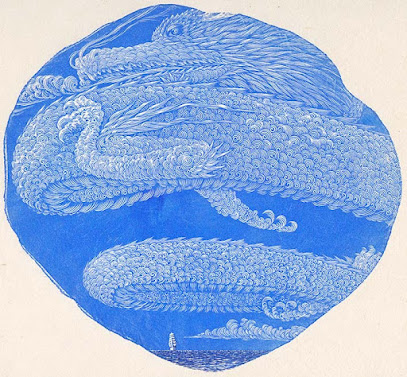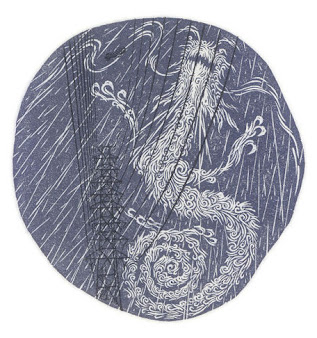Just a short post today as I’m hard at work preparing for the April A to Z Blog Challenge (foreshadowing). But that doesn’t mean I don’t have something amazing! Here are two wood engravings of wind dragons by Atsushi Matsuoka (Japan, b. 1971). To review, wood engravings are carved on hard, fine end grain, which means the block of wood is cut across the branch or trunk of a tree, not along its length. That means there’s a limit to how big a block can be, without either joining up multiple chunks of wood, or using synthetic substitutes for natural wood. And that means that most wood engravings are very small. Moreover, nowadays it’s quite common for artists to use the actual irregular round shape of the tree’s cross section, as opposed to wasting surface area by chopping off the edges to make square or rectangular blocks. Matsuoka shows this technique in today’s two pieces. The second is fairly round, which is pretty straightforward from a design point of view, but the first is a little more irregular. Matsuoka had to decide how to use the shape of the wood for his composition, and he put the smaller, more pointed part toward the bottom so the piece is almost more diamond-shaped.
Both pieces show flying dragons composed entirely of tiny curled lines, so that they are simultaneously scaly and puffy like clouds. I love how they look like wispy dragons made of air, wind, and cloud. The first is the enormous power of the entire sky, blowing the sailing ship across the ocean. The second is a rain dragon. We’re looking upward into the rain, and the power lines (printed with a separate block) evoke the electric power of a storm.
Now that spring is upon us (here in the northern hemisphere), I hope the rain dragons are benevolent to us this year!
[Pictures: Direction of the Voyage, wood engraving by Atsushi Matsuoka, 2020;
Raining, wood engraving by Matsuoka, 2013 (Images from Atsushi Matsuoka).]



1 comment:
These are amazing! I really like using the round shape instead of cutting off the edges.
Post a Comment